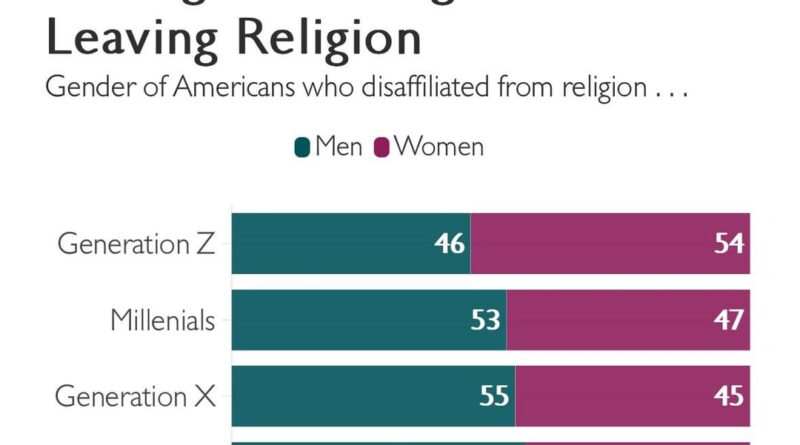Gen Z Female Atheism Surges, Kamala Harris Wrongly Unconcerned
Over the years, research in religious demographics has consistently suggested women to be more devoted to religious beliefs in comparison to men, a trend observed across numerous countries and using multiple measures of religiosity such as frequency of prayers and importance of faith. Researchers of societal studies have yet to determine an accepted reason for this pattern but proposed theories vary widely; from women’s likelihood of being risk-averse, to religion providing women a sturdy support system amidst life occasions such as birth, death, and parenthood.
However, recent studies conducted in the United States somewhat contradict this extensively acknowledged trend of female preponderance in religiosity. With a focus on Generation Z, there have been a number of surprising discoveries, hinting at an array of socio-religious divides across the nation. The belief in women’s superior religious tendency is being questioned.
Early in 2023, the American Enterprise Institute’s Survey Center on American Life came up with astonishing findings that broke away from traditional trends of religiosity. The survey revealed that 39% of Gen Z women claimed to have no religious affiliation, slightly higher than 34% of Gen Z men expressing the same.
The recent results from the Cooperative Election Study, a nation-wide survey, found that the younger men of millennials and Gen Z – those born post-1990, show a marginal inclination for weekly religious congregations more so than their female counterparts. However, this switch in religious commitment should be considered cautiously.
The data from the highly regarded 2022 General Social Survey put forward a contrasting view: women aged between 18-45 years continue to hold a higher likelihood to frequent places of worship almost every week in comparison to men in the same age bracket. Concurrently, the February 2025 Pew Religious Landscape Study concludes that while the religious gender gap in America seems to be narrowing, there are no known birth cohorts where men exceed women in religious preferences.
In summary, a growing collection of survey insights suggests that the overall religiosity of young American adults shows little gender differential. The narrative of increasing number of young men engaging in church activities or joining religious communities such as Eastern Orthodoxy might stir attention, but the data fails to support an actual reversal in the gender gap – the gap is simply lessening.
If the religious gender disparity in America is evolving, politics might offer useful insights into the transformation. It seems that young men’s political views are edging towards the right, while young women show an increasing inclination towards progressive values.
An NBC News poll in April 2025 exhibited gender-based political divide with men aged 30-44 showing roughly 9% more approval for Donald Trump’s performance in comparison to women in the same age group. This gap heightens to an alarming 21 points among those aged between 18-29.
Interestingly, males aged 18-29 pinned greater importance to ‘being married’ and ‘having children’ than females of the same age. For Gen Z men who sided with Trump, ‘having children’ was paramount, however, this was not the same for women who supported Kamala Harris. They placed ‘having children’ at a much lower priority.
The dominating religious beliefs in present-day America are evangelical Protestant Christianity and Catholicism, both of which endorse traditional gender roles, marriage, and having children. These teachings appear to be in conflict with the ambitions of many progressive young women striving to make headway in the professional world and society at large.
Experts suggest that this tension, along with views regarding LGBTQ+ rights, have contributed to a drift of women away from institutional religion. As a result, Gen Z provides the most conspicuous example of the growing ‘God gap’ in American politics.
Religion within two significant parties have veered in opposite directions. In the 1990s, 67% of Republicans and 63% of Democrats expressed unwavering belief in God, according to an analysis of General Social Survey data. Such firmness of belief among Democrats fell to 39% by 2022, while the belief among Republicans remained relatively constant at 63%.
The proportion of Democrats visiting places of worship regularly stands at 28%, compared to 42% for Republicans, revealing a notable change since the 1970s when the gap was merely 4 percentage points.
With growing numbers choosing places of worship in alignment with political alliances rather than purely theological beliefs, the diversity within congregations is at stake. Moreover, contrasting priorities between men and women may impede the process of finding a suitable life partner. Less interaction and dialogue may make it challenging to find a common ground. These demographics are indicative of a future where polarization transcends political boundaries and deeply affects American life in aspects of worship, marriage, and community formation.

